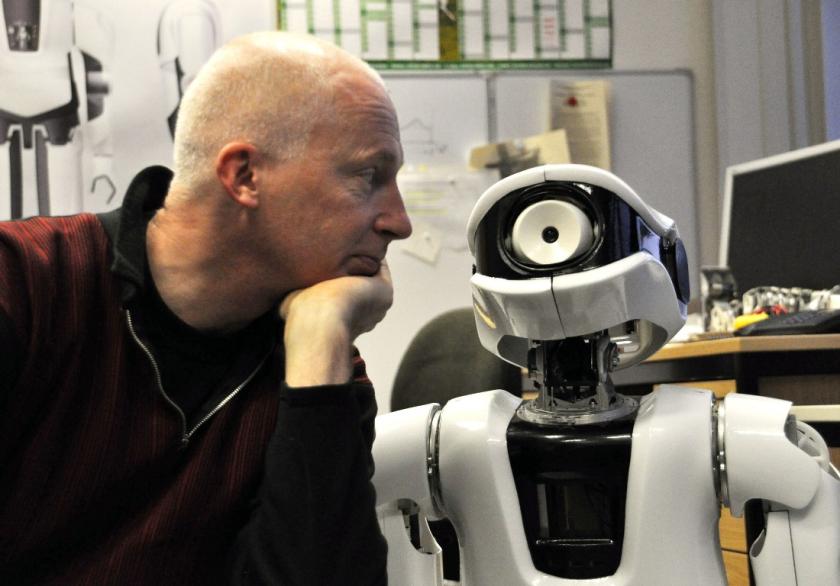What is it with these scientists? Two spanking-new child-sized robots stand opposite each other in a room, talking. Their designer proclaims with barely concealed pride, “I don’t know which one is going to speak first.” In fact he says this twice, as if this very fact is proof that these bipedal assemblages are on the cusp, or have even reached some kind of sentient intelligence - rather than simply being mildly amazing, mildly amusing mimics of sentient intelligence. However, the banal reality of these chatty contraptions is that they have randomness programmed into them, just as dice do.
OK, so they were speaking their own language which they'd created themselves, learning from each other as they went along. But for me this was no more impressive than an elaborate Derren Brown routine, in that it looked miraculous but was in fact just very, very clever. With films such as Terminator 2: Judgment Day in the back of one’s mind, it’s disconcerting to watch what could be the beginning of the rise of the machines. And last night’s Horizon certainly played on such celluloid-driven fears, as wide-eyed presenter Marcus du Sautoy ominously intoned questions such as, “What are these machines? Or who are they?”
Blue Gene could do in an hour what us mushy-brained primates would take half a lifetime to do
But another segment of the programme should have been enough to calm down even the most paranoid and pessimistic of sci-fi doom merchants. Blue Gene is one of the most powerful supercomputers in the world, yet it also looks like a throwback to an era when computers filled large rooms. Du Sautoy could barely hear himself interviewing its inventor, Fred Mintzer, so loud was the ocean roar of the cooling systems of its numerous filing-cabinet-sized racks of computational circuitry. It could do in an hour what us mushy-brained primates would take half a lifetime to do. And yet when Du Sautoy – displaying a healthy degree of scepticism for once – asked if it was “just an enormous number cruncher”, the answer was, sadly (or rather, thankfully), yes. Programmed intelligence is not artificial intelligence, even when it’s operating on such a colossal scale. In the simplest of layman’s terms: you only get out what you put in.
Another experiment effectively demonstrated that we’re still a lifetime away from having an AI-run Big Brother surveillance system. Computers can only “see” a tiny area of what’s on a CCTV monitor at any one time, continually scanning the screen in order to see the full picture. But then, of course, even if they could see the full picture they’d never get the full picture. Because to do so they’d have to bring into play intuition, suspicion, wariness, curiosity - to name just a few human characteristics that are useful when keeping on eye on hoodies skulking around shopping mals. For example, even the most sophisticated computer-driven surveillance system would not be able to tell if two drunken men were play-fighting or genuinely fighting.
Whatever name you give to the indefinable core of what it is to be human, it will always be an unachievable goal for AI
It wasn’t even the case that much new evidence was presented on last night’s Horizon to suggest we should be heading for the hills. How many times before – from Tomorrow’s World onwards – have we been told that humanoid robots can do their 6,789-times-table, and yet running, walking – or even just standing – is a real bugger? Or that they’re not much cop at art? Yes, good old robot art: it’s always amusing to see the nauseatingly soulless daubs that don’t even convince as bad graphic design. I wasn’t going to mention the soul, primarily because I doubt its existence. But documentaries on artificial intelligence bring out the hopeful agnostic in me, simply because they reaffirm just what a mysterious, marvellous and intangible thing human consciousness is.
I suspect that whatever name you give to the indefinable core of what it is to be human, it will always be an unachievable goal for AI. The fact is that, despite the admirable vision and wishful thinking of our most dedicated scientists, we are still a zillion miles away from an AI robot that could be considered as anything other than quite cute, a glorified children’s toy. How do you programme in curiosity, passion, excitement, imagination, joy?
By the end of this programme, Du Sautoy himself was willing to admit that true artificial intelligence was still a long way away. He also pointed out that perhaps trying to make AI machines imitate us is a false trail, which is something I'm in complete agreement about. But it’s been a false trail for half a century or more. We want to believe we can create friends and helpers out of silicone and plastic. In fact our urge to anthropomorphise is so strong that if Apple started sticking eyes on iPods, I think part of us would suspect them of having acquired independent thought. But then that's what makes us so wonderfully, stupidly human.















Add comment